A good villain is one who is both intimidating, yet
admirable to a degree. Not admirable in
that you want to be like them, but you can respect their power, or their
motives, or they are relatable, in that you find something about them in
yourself. These villains are ones we
love because we hate them. They are the
perfect opposing force for our heroes.
And here's a tribute to the 10 villains I love to hate the most. Needless to say, there will be spoilers.
SPOILER WARNING!!!
Kefka (Final Fantasy 6)
I bet everyone knew this was coming. Kefka, the psychotic clown. Of course he makes the list. There's something undeniably scary, but also
silly about Kefka. Despite wielding
immense magical power, he never really does much with his life besides
kill. And normally, this would be
horrific, but he's so gleeful and childlike at times that it's hard to chastise
him. Kefka laughs and rhymes and makes
terrible jokes and is garbed in harlequin's makeup. Despite being a truly evil villain, he's one
of the silliest characters in all of Final Fantasy. What makes Kefka more intimidating, however,
is that despite being silly and childish, he's ruthlessly clever, cunning, and
unconstrained by morals. He'll poison an
entire population just for fun, kill his master to serve his ambition, and all
the while seem like an unassuming fool.
Kefka literally becomes a god halfway through Final Fantasy 6, merging
with the three mystic forces that created the world to take full control over
them and become a god of magic. The
world is turned inside out and Kefka watches it burn with unprecedented
glee. For all his malice, though, Kefka
seems like he's lacking. He finds no use
or purpose in life and so wants to end all of it. Nihilism at its core. Even becoming a god didn't cure him of
it. While he is maliciously evil, Kefka
has a kind of charm to him, with his horrific acts juxtaposed by his crazy
personality and clown-like appearance.
Also, while most villains seek to control or destroy the world but are
always thwarted, Kefka managed to do both and was only stopped years after he'd
become a god. Perhaps what is most
interesting is that Kefka's death is almost like a middle finger to the heroes,
as all their magic is now useless without him, the god of magic. If they want to live, he's forcing them to do
it the hard way. For how irredeemably
evil, yet undeniably fun and funny he is, Kefka remains a favorite of mine even
years after I first saw his goofy face and heard him proclaim "You son of
a submariner!"
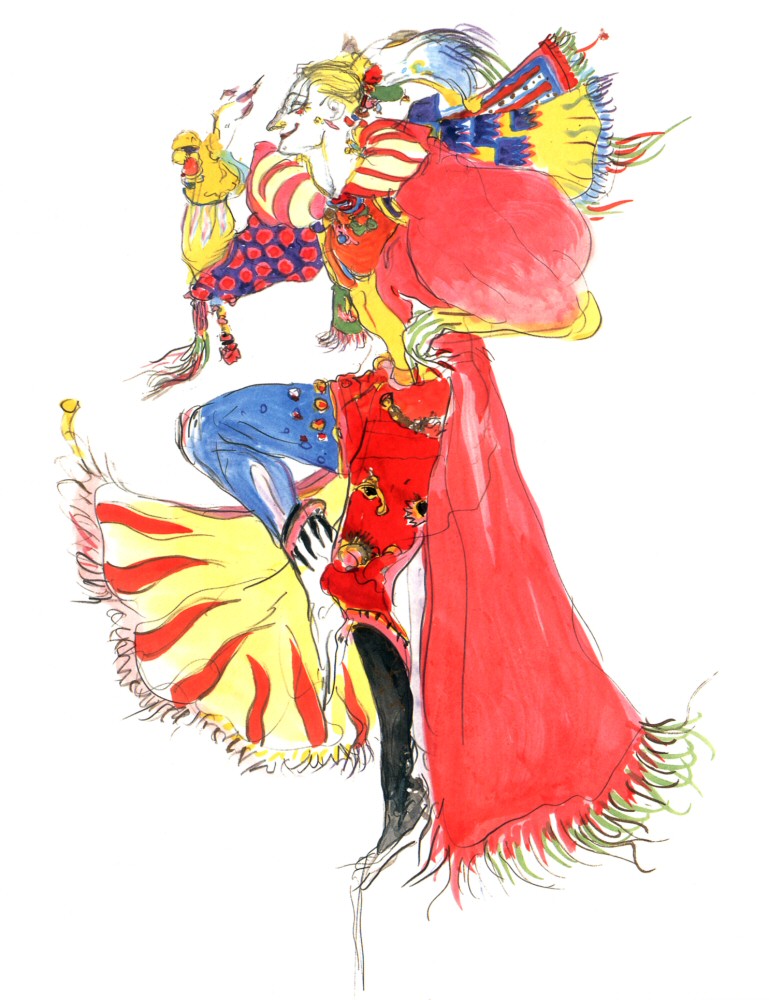 |
| The fool dances to his own tune, creating and destroying in equal measure. He is totally self involved, unaware that all his sound and fury ultimately signify nothing. |
Sephiroth (Final Fantasy 7)
I know some people are going to roll their eyes at this
inclusion, but hear me out. You see,
when I first played Final Fantasy 7 in 1996, Sephiroth wasn't the overpowered,
momma's boy, bishounen that he eventually became thanks to media overexposure
and what not over the years. My first
encounter with Sephiroth was when I had escaped the prison in Shinra tower and
discovered that all hell had broken loose.
The tower was decimated, countless guards were dead, and the president
of Shinra had been impaled on a sword. I
went in with about four guys and had to sneak, battle, and work my way up to
the top, but one guy utterly destroyed the place. For a little bit, I was actually scared. Sephiroth created an atmosphere around him
throughout much of the game that made him scary, because chaos and death were
always on his heels. He goes to
Nibleheim? Town is burned to the ground
and almost everyone dies. Follow him to
the Ancient City?
One of your team permanently dies. What impressed me the most, however, was the
Midgar Zloom. It's a giant snake that's
easily ten times your size and which can casually annihilate your party when
they first meet it. When the party cross
the Midgar Zloom's marsh via chocobo, they see a Zloom impaled upon a giant
tree trunk by Sephiroth, as if it were nothing.
That is power, cruelty, and terror.
Sure, he's had a bit too much exposure lately, but Sephiroth was true
fear for a while, creating an atmosphere more in line with survival horror than
a JRPG. That's one of the reasons I
still love him.
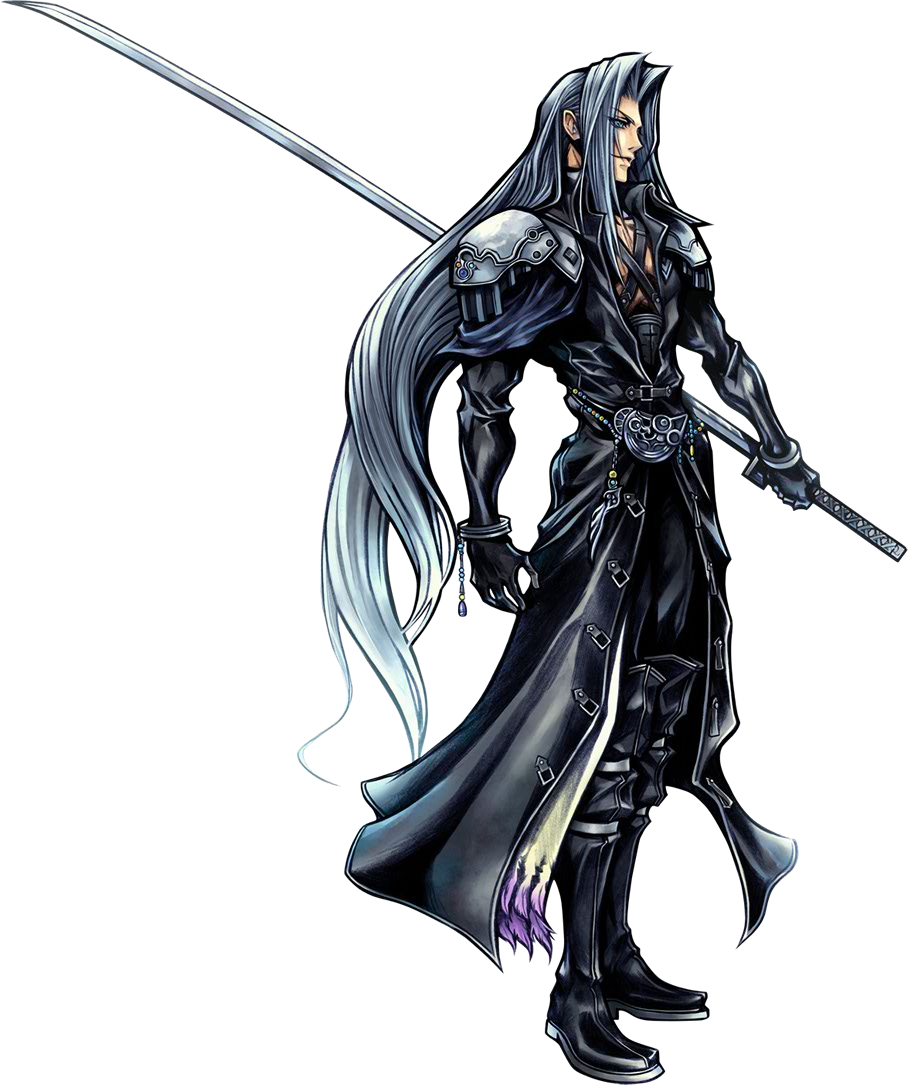 |
| The devil spreads death and chaos wherever he goes. He is fear made manifest and his cruelty extends to all things, good or evil. |
 |
| One man did all this. No...not a man. A monster. |
Grahf (Xenogears)
Words do not describe the sheer oddity or the sheer terror
that Grahf inspires. Grahf is, in a
nutshell, a split personality of an ancestor of our hero, Fei Fong Wong, that
became a parasitic psychic entity after he lost his most cherished friend and
lover. This entity became obsessed with
power and would frequently body snatch those close to his reincarnated self, as
his body and spirit had died, but this facet of his personality lived on. Grahf seeks ultimate power for the purpose of
destruction, reducing all those around him to ash. Yet, he is also a cautionary tale about how
absolute power corrupts and will ultimately destroy us. Grahf is constantly watching Fei Fong Wong in
Xenogears for the purpose of using him, as he is another reincarnation of
Grahf's previous form and Grahf believes Fei will lead him to the ultimate
power he seeks. Fei, possessing a
similarly destructive split personality, is both at odds with and subservient
to Grahf, as his evil persona, ID, was trained and manipulated by Grahf from
childhood to adulthood. Perhaps Grahf's
most signature trait is that he possesses the ability to give others
extraordinary power. Power that is so
intense that it will literally burn them out, leaving them naught but a
withered husk of their former selves.
The real kicker? Grahf needs a
body for his persona to attach to and when he makes his final stand against
Fei, it's revealed that the body he took was that of Fei's father. Grahf has no redeeming qualities, but is
interesting for his aesthetic, resembling something like Darth Vader if he were
more dramatic and monstrous, and for his situation, being a psychic entity
which has walked the earth for centuries seeking the power to purify it in
flames. While a bit one note at times,
Grahf is an interesting look at just how out there a villain can be while still
being taken seriously. In spite of his
odd back story, Grahf stands tall as a villain, acting as both the catalyst for
Fei to overcome his own weakness and as a cautionary tale of how power and loss
can corrupt even the best of us.
Kato (Shadow Hearts: Covenant)
In a game series full of tragedy, where the bad endings are
frequently canon, Kato appears as a most unlikely villain. A special forces agent for Japan at the turn of the 19th
century, Kato has unlucky metaphorically stamped on his forehead. He lost the woman he loved due to internal
fighting and betrayal and became jaded about his own weakness, especially after
seeing his friend Yuri Hyuga defying fate.
So, Kato did what many men in the series did and set about trying to
change his destiny. He used forbidden
necromantic documents to revive the woman he loved in an artificial body,
though she held no memories, created artificial super soldiers, and tried to
make Japan strong by
enslaving a biblical demon from Europe. Yuri and his friends had to stop him, but
Yuri and Kato understood one another, both having lost their true loves. Yuri had to stop Kato because he knew what
would happen if that power ran amok. And
Kato tried anyway, out of love. In the
end, Kato lost his love a second time and tried to change fate directly,
meddling with time itself, in order to settle things. However, even as he and Yuri squared off,
there were no hard feelings. They both
knew that there was no turning back. And
that's why I like Kato. Honorable, true
to his friends and his convictions, and a romantic at heart. He started the Shadow Hearts series as a weak
incidental character but improved himself and made himself strong. All for the sake of love. Kato is the perfect sympathetic villain, as
you both feel sorry for him but cannot allow him to continue, for the greater
good. Over the course of the game,
players even get a chance to control Kato's super soldiers and work with him, endearing
him to the audience, despite his goals, and his introduction was early enough
that the players probably didn't see him as becoming the main villain, even
though it makes perfect sense when he does.
It seems as if Kato is meant to suffer, but his drive is a force to be
reckoned with.
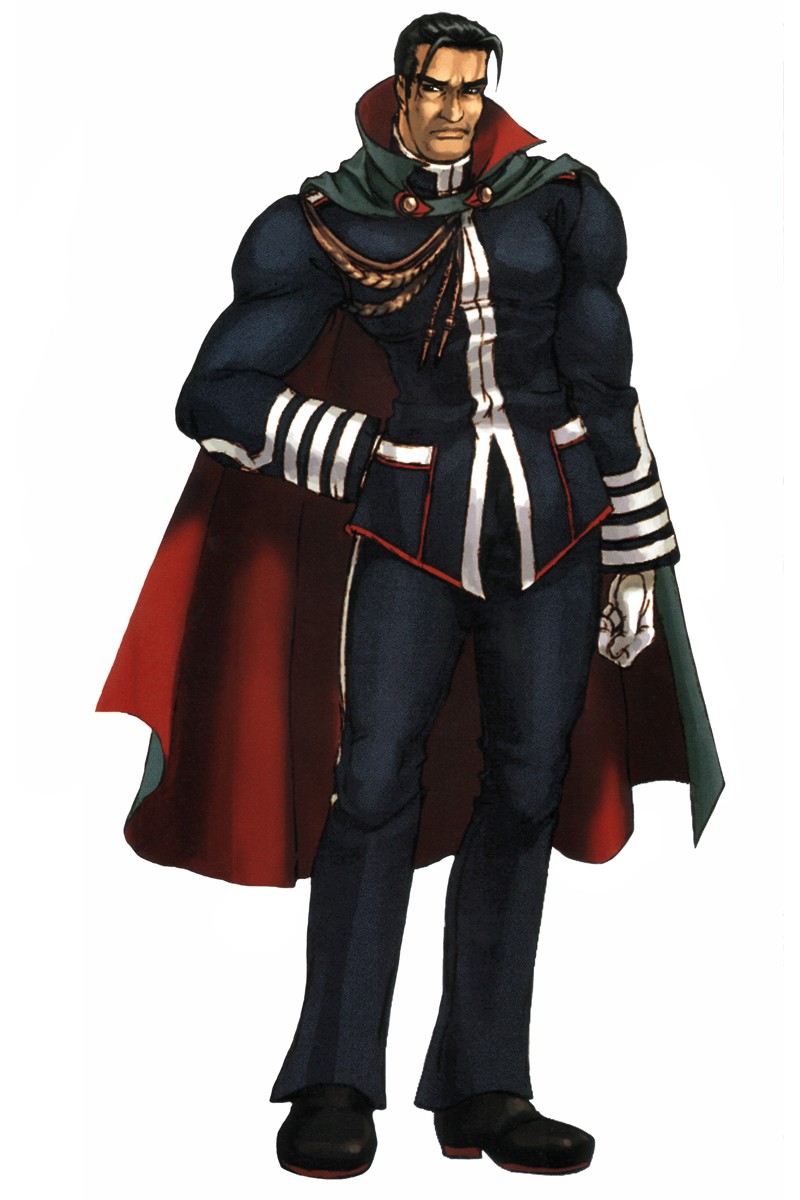 |
| The soldier is supposed to work for the betterment of his country. Must he then sacrifice all he holds dear to achieve this? Or shall he defy fate for a chance at happiness and redemption? |
Lezard Valeth (Valkyrie Profile series)
There has never been a more obnoxious, arrogant, and
hilarious bastard in Midgard or Asgard than Lezard Valeth. He's a sorcerer with immense natural talent,
an inquisitive mind, and no moral qualms about furthering his research. He's Shakespearean in his wording and loves
to analyze and argue points. He's
charming, despite being a tad insane, and he's madly in love with the warrior
goddess Lenneth Valkyrie, who he's trying to build a mortal body for. Lezard, despite being really, REALLY, evil,
is too silly, crazy, powerful, and...human, to dislike. In fact, to further his goals of attaining
his love, he actually helps save her from death by putting her into one of the artificial
bodies he made. Later, he warps back in
time to try and kill Odin, lord of the gods, and usurp his position. And he does it with ease. Coupled with all that, Lezard possesses the
philosopher's stone and was the only human not under the protection of Lenneth
Valkyrie to survive the end of the world, Ragnarok. Even if his schemes are evil, horrific, or
morally questionable, there's always a sense of fun with him. Lezard is both respected by his colleagues
and victims, but also the butt of many jokes, as a classmate of his frequently
teases him and calls him a freak with a lolita complex despite his immense
power. Perhaps what's scariest about
Lezard, however, is that even though he has a fun loving, inquisitive, and
enjoyable demeanor, he can be ruthlessly cunning and totally amoral. When he warped into the past, he lied and hid
his true nature to become an apprentice to three sorcerers and got close to
another Valkyrie named Silmeria. No one
suspected a thing until he was already ruling Asgard. He also outright admits that the majority of
his plan to take control of Asgard and alter history was just to lure Lenneth
into a situation where he could control her.
It is only through the intervention of the other Valkyrie and their
allies that he is stopped. However, even
if he is a villain, Lezard is just fun. He
laughs frequently, tells lewd jokes, and just enjoys life, even if he's the
only one having fun at the time. What's
not to love about Lezard Valeth?
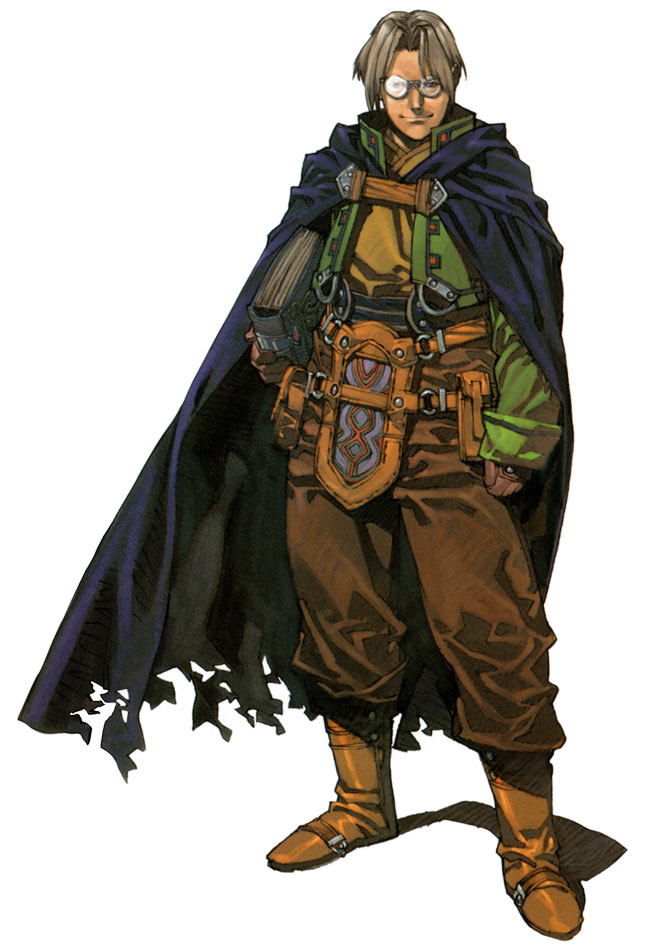 |
| The magician revels in knowledge and power, feeling no sacrifice is too great or compromise too unlikely for the sake of his experiment. |
Galcian (Skies of Arcadia)
Galcian is a fascinating villain for all his nuances. He's the leader of an evil empire's airship
armada, skilled with a blade to the point where he's almost untouchable,
stealthy enough to manipulate his empress and his enemies while cunning enough
to appear on the level to both, and surprisingly loyal to his comrades, all
things considered. Even those he turns
on, he treats with some degree of honor and respect. Galcian once had to kill an old friend of his
for letting a group of sky pirates escape him and they fought. Galcian won, but warned the guards to take
care of the body, for it was worth far more than any of them. His most trusted assistant, Ramirez, held the
key to ultimate power in his body and would have sacrificed his life so that
Galcian could remove it. Instead,
Galcian found another way, in order to spare the life of his associate. Nothing seems to phase Galcian, as he is
prepared for all outcomes in a battle, even if it is a loss. The single time he shows any manner of shock
is right before his death, and that was likely due to the way he died. Galcian shows no favoritism to allies and
only respects those who are useful, which is quite refreshing as one of the
minor villains of Skies of Arcadia is a snobby, but incompetent, aristocrat who
acts as an airship captain. He lies and
cheats his way into the army's top brass and frequently makes excuses, but
Galcian doesn't take any of it and disciplines and demotes him regardless. Even though he acts without remorse,
Galcian's vision of the world is almost one people can get behind, with his
armada acting as a police force. People
would be welcome to live in peace and without fear so long as they obeyed his
will. True, it would be totalitarian,
but compared to the empire he would be replacing, it'd be much more
desirable. Galcian's ambitions are to
destroy his corrupt empire and conquer the world for his own sake. And he believes he can do it. Everyone believes he can do it. That's what makes him so dangerous. And, to top it off, he has a beautiful woman
for a girlfriend who also commands a battalion of airships for him. Bonus.
 |
| The emperor holds dominion over all he surveys. Strong, just, confident and utterly ruthless, his greatest flaw is putting his ambition before his heart. |
Gannondorf (LoZ Twilight Princess)
With Gannondorf, I'm kind of being selfish, because he's not
a well rounded villain, a well spoken villain, or even a very deep
villain. But I admire his power and his
aesthetic. Gannondorf is gifted with the
Triforce of power, because he desires power over all things and this strength
of his is what allowed him to reach out from beyond the Twilight realms and
corrupt the false king, Zant, thus starting the Legend of Zelda: Twilight
Princess proper. He is able to control
others, turn into a giant beast, summon a horse and riders to support him and
when facing a monster formed of ancient and destructive twilight magic,
Gannondorf shrugs it off and crushes its head.
Gannondorf is not very nuanced, but his power makes him pretty bad
ass. And it's not just that he has power
which makes him cool, but rather, the way in which he uses it. For example, he could fight Link head to
head, but instead amuses himself using Zelda as his puppet and fighting through
her. Or, as a show of irony, uses the
sword which impaled him as his personal weapon.
Even if few words pass Gannondorf's lips, it's plain to see that there's
something's going on behind those cold eyes.
Apart from that, Gannondorf just looks like a conquering king, with his
tied back dreadlocks almost forming a crown, his pitch black armor, and his
ability to ride and fight on a horse.
Gannondorf, to me, also wins this spot for his role in Super Smash
Brothers Melee and Brawl, where his obscene power is enough to punch people
beyond the realm of the screen and kill them with very little effort. He takes skill to use, but he is a fun
villain to have on my list. Gannondorf
is power and style, all wrapped up in a nice little package.
.png) |
| The usurper is power made manifest. Nothing can stop him. Not royalty, not sages, not death. He turns his pain into power and fights without fear. |
Xehanort: All Incarnations (Kingdom Hearts series)
I find something positively enchanting about all
incarnations of this Kingdom Hearts villain.
Despite his role as ultimate evil, a greedy, selfish incarnation of how
a good power can be turned wicked, Xehanort remains pretty engaging as a
character, in my opinion. In the first
Kingdom Hearts game he is a very dramatic, almost Shakespearean figure, using
his words and his mere presence, which at that time was without physical form,
to manipulate Riku, best friend to our hero, Sora, before ultimately possessing
him. Xehanort only evolves from there,
going from a shadow of his former self to a being gifted with power over the
darkness in hearts, which grants him near limitless strength, as all hearts
contain at least some darkness. He uses
this power to continue his pursuit of knowledge and the ultimate heart, Kingdom
Hearts. Even after his defeat, he
lingers within Riku, tempting him with offers of power but also helping the boy
to grow into his own. After all is
settled in Kingdom Hearts 2, the prequel story, Birth by Sleep, reveals the
truth of Xehanort. A grim, jaded old man
who despite his frail appearance is one of the strongest Keyblade masters to
ever live. His search for the truth of
the heart and for knowledge led him to become cunning and deceptive, so that he
could corrupt and manipulate a youth named Terra before stealing his body. Xehanort is interesting because while he will
not hesitate to manipulate, corrupt, fight, or lie to achieve his ends, he is a
scholarly individual, musing on the nature of good and evil, light and
darkness, right and wrong, and constantly seeks knowledge for his goals. He's revealed to not be entirely heartless
either, such as when he managed to aid Riku and encourage him, or when after
hurting his own apprentice, he returned him to the islands he grew up on so the
apprentice could rest. While his plans
can be a bit too elaborate at times, he's interesting for his scholarly
pursuits and because there are shades of a time when he was actually a warrior
for the light, before his obsession and fear surrounding death and
heartlessness jaded him.
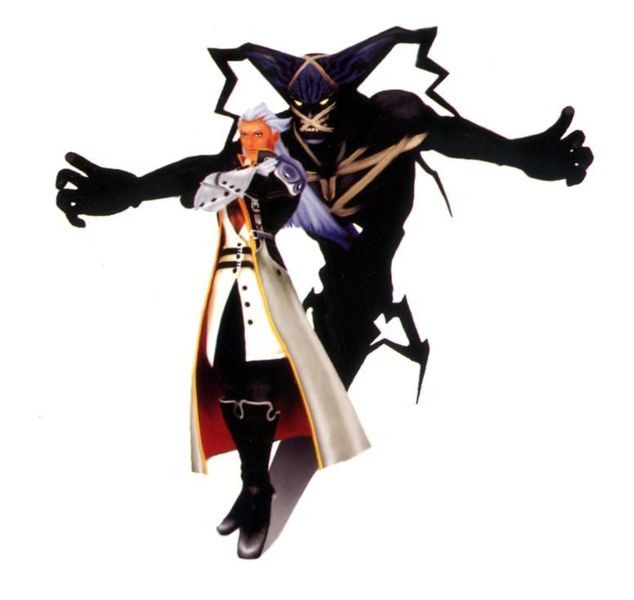 |
| The scholar quests for answers within the darkness. He cares not for those hurt by his goals, he cares only for truth. No act is too cruel, no betrayal too great, so long as he finds answers. |
Creator (Aquaria)
Children are selfish. Children act without thinking. Children are almost always sure they are
right. And the Creator in Aquaria is a
millenia old child. Formed when a child
falls from a city in the sky into the ocean and merges with a god-like power,
the Creator is one of the most despicable, but also tragic villains I've ever
met. He lost his home and his mother and
spent his eternal life trying to recreate her under the sea. And each time he failed to make her
"Perfect" he destroyed the civilization that had been created by his
"mother." This means the
Creator of Aquaria has singlehandedly committed genocide almost 12 times,
sparing only the mother figures, usually, out of some misguided form of love. He hounds Naija, the hero of Aquaria,
throughout the game, constantly seeking her mother, Mia, his
"perfect" creation. And yet,
in the end, he was just a child given power he never wanted. He only desired to return home and be with
his mother. And when Naija defeats him,
his final request is that she sing him to sleep with the lullaby of his
mother. The Creator is an interesting
look at both the psychology of a child and how gods can be very much like
children. You see, children only develop
ideas of right and wrong after a certain age when their brains become advanced enough
to understand morality. But the Creator
never seemed to understand what was wrong with his actions, following the logic
of, "I created it, it is mine, I can do with it what I please." This draws a nice parallel to other gods in
myth and religion because while they always act like they are right, they can
at times be petulant children. They will
punish their creations on a whim and call it just because they are the ones who
made them. They lack basic ideas of
morality or willfully ignore them for their own pleasure. The Creator is an interesting look at how
pathetic a god can be when brought low...and also how tragic they can be, since
despite his power, the Creator could never have what he truly wanted. He only found peace when Naija sang him to
sleep.
 |
| The child thinks himself a god. He sees no consequences of creation and no wrongs in destruction. Without a guiding hand, he will continue to spread misery until it engulfs him entirely. |
Creator (Final Fantasy Legend)
The Creator from Final Fantasy Legend was something of a
tossup, since I only had 9 villains who absolutely had to make the list. But, let's just say that the Creator is kind
of beautiful in shock value, symbolism, and in how his actions affect the
players. You see, in Final Fantasy
Legend, heroes must climb a tower that reaches into the sky, fighting fiends
and monsters on each floor they arrive on and seeing all manner of sights, from
an ocean world, to a cloud kingdom, to a dystopian nightmare. However, when they get high enough, they
fight Ashura, who offers to give them worlds of their own to rule. When they refuse and beat Ashura, they are
deposited back in the first world and, with no further fiends above them, reach
the top of the tower, where it is revealed that the entire tower and the worlds
below are merely a game for the Creator, the god of the world. In essence, he created the tower, Ashura, and the worlds as a game, creating everything for the purpose of entertainment. He was amused by the heroes efforts to reach paradise, at the top of the tower, and watched them every step of the way. He is the designer of this world...a game designer. The Creator sees nothing wrong with what he's done,
since to him the characters are little more than bits of data, but the heroes
are horrified at having their lives and the lives of their friends manipulated
by this callous god. So, they defeat him
and are presented with an opportunity to see behind the Creator's door, to
enter his world, a place none have ever seen, possibly the paradise they have been seeking.
And they choose to go home instead.
Even if their world was just a game, it had become something real to
them. I love this villain because you
never saw it coming, but it kinda makes sense in a metaphysical way. His actions and thoughts likely mirror our
own, making both designer and player kind of the villain here, but it also
shows that constantly moving forward isn't the only way. Sometimes, when the adventure is done, it's
nice to return home and spin your stories around a campfire.
 |
| The god sees all the world as a game. For his own amusement, people fight and die. However, is is only when the god is brought low that he realizes his folly. The world is far more than just a game. |
And those were the greatest villains I've discovered. They each have something special about them
which endears them to the audience, which is important, but are also unapologetic
about their actions which seek to hurt countless innocent lives. It makes sense for the heroes to stop them,
no matter how charming they may be. And
in my opinion, that's what makes a good villain. They are likeable, even understandable, but
also unapologetically evil, doing either malicious or selfish acts for their
own personal gain. They aren't evil
because "Wooooooo the plot needs a bad guy!" they're evil because it
serves their needs. That's
understandable. That's human. And that's scary.


No comments:
Post a Comment